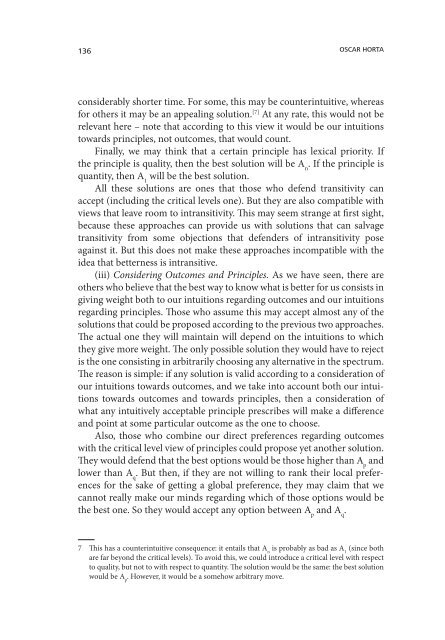Diacritica 25-2_Filosofia.indb - cehum - Universidade do Minho
Diacritica 25-2_Filosofia.indb - cehum - Universidade do Minho
Diacritica 25-2_Filosofia.indb - cehum - Universidade do Minho
Create successful ePaper yourself
Turn your PDF publications into a flip-book with our unique Google optimized e-Paper software.
136<br />
OSCAR HORTA<br />
considerably shorter time. For some, this may be counterintuitive, whereas<br />
for others it may be an appealing solution. [7] At any rate, this would not be<br />
relevant here – note that according to this view it would be our intuitions<br />
towards principles, not outcomes, that would count.<br />
Finally, we may think that a certain principle has lexical priority. If<br />
the principle is quality, then the best solution will be A n . If the principle is<br />
quantity, then A 1 will be the best solution.<br />
All these solutions are ones that those who defend transitivity can<br />
accept (including the critical levels one). But they are also compatible with<br />
views that leave room to intransitivity. Th is may seem strange at fi rst sight,<br />
because these approaches can provide us with solutions that can salvage<br />
transitivity from some objections that defenders of intransitivity pose<br />
against it. But this <strong>do</strong>es not make these approaches incompatible with the<br />
idea that betterness is intransitive.<br />
(iii) Considering Outcomes and Principles. As we have seen, there are<br />
others who believe that the best way to know what is better for us consists in<br />
giving weight both to our intuitions regarding outcomes and our intuitions<br />
regarding principles. Th ose who assume this may accept almost any of the<br />
solutions that could be proposed according to the previous two approaches.<br />
Th e actual one they will maintain will depend on the intuitions to which<br />
they give more weight. Th e only possible solution they would have to reject<br />
is the one consisting in arbitrarily choosing any alternative in the spectrum.<br />
Th e reason is simple: if any solution is valid according to a consideration of<br />
our intuitions towards outcomes, and we take into account both our intuitions<br />
towards outcomes and towards principles, then a consideration of<br />
what any intuitively acceptable principle prescribes will make a diff erence<br />
and point at some particular outcome as the one to choose.<br />
Also, those who combine our direct preferences regarding outcomes<br />
with the critical level view of principles could propose yet another solution.<br />
Th ey would defend that the best options would be those higher than A p and<br />
lower than A q . But then, if they are not willing to rank their local preferences<br />
for the sake of getting a global preference, they may claim that we<br />
cannot really make our minds regarding which of those options would be<br />
the best one. So they would accept any option between A p and A q .<br />
7 Th is has a counterintuitive consequence: it entails that A n is probably as bad as A 1 (since both<br />
are far beyond the critical levels). To avoid this, we could introduce a critical level with respect<br />
to quality, but not to with respect to quantity. Th e solution would be the same: the best solution<br />
would be A p . However, it would be a somehow arbitrary move.<br />
<strong>Diacritica</strong> <strong>25</strong>-2_<strong>Filosofia</strong>.<strong>indb</strong> 136 05-01-2012 09:38:26











![Programa [pdf] - cehum - Universidade do Minho](https://img.yumpu.com/17305425/1/190x135/programa-pdf-cehum-universidade-do-minho.jpg?quality=85)




